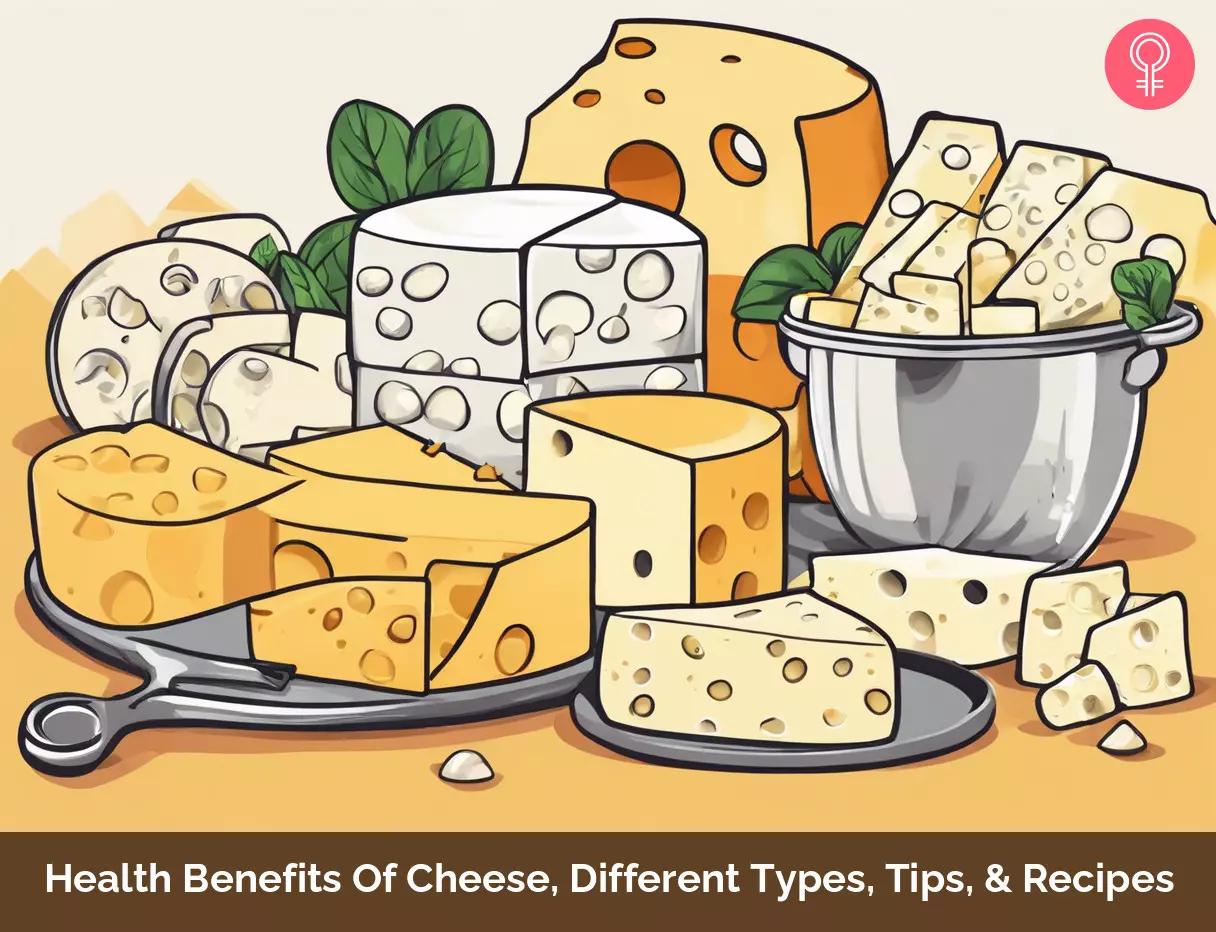The benefits of cheese include promoting bone and dental health, reducing blood pressure, promoting weight gain, and possibly even protecting against cancer. This article discusses the benefits of cheese, its nutritional profile, how to use it for maximum benefits, and any potential side effects. Keep reading.
Nutrition Facts
Cheese contains many vitamins and minerals. According to the United States Department of Agriculture, (USDA) 100g of cheese contains (1): Who Can Consume It? Everyone can consume it, except for people who are lactose intolerant and allergic to milk proteins. How Often? Around 40 gms of cheese every day is safe for consumption. Caution Individuals with weight issues and cardiovascular diseases should consume low-fat and low-sodium cheese.
Energy – 362 kcal Protein – 5.17 g Carbohydrate – 50 g Calcium – 69 mg Sodium – 181 mg Saturated Fatty acids – 3.45 g Cholesterol – 34 mg
It is a rich source of protein, vitamin A, vitamin K, and calcium. It can offer a variety of health benefits, which we will explore in the following section.
Health Benefits Of Cheese
1. May Promote Bone Health
Cheese is a rich source of calcium, magnesium, vitamins, and protein (2). It helps promote bone health in the elderly, children, and pregnant and lactating women (3). Calcium deficiency and low bone density are the factors responsible for osteoporosisi A bone disease in which bones turn weak and brittle due to low bone mineral density, making them prone to fractures. (4). Cheese contains both vitamin D and calcium and helps maintain bone health (5). Vitamin B found in cheese also helps in promoting bone health (6).
2. May Improve Dental Health
Cheese is a rich source of calcium and may contribute to strong teeth. It may help reduce dental cavities. This could be attributed to the presence of casein phosphopeptides in cheese (7). Chewing cheese may increase the pH levels of the mouth and promote overall oral health (8). Certain components in cheese may adhere to the teeth and protect them from erosion. However, more scientific evidence is needed in this regard.
3. May Reverse Hypertension
Sodium and cholesterol can cause high blood pressure. Low-sodium cheese is available that can keep blood pressure from rising (10). Vitamin B in cheese is also found to be useful in reducing high blood pressure (11), (12). Many types of cheese available on the market have high cholesterol and sodium content. Hence, be careful while choosing cheese. Go for low-sodium cheese. Consuming foods rich in potassium levels may reverse hypertension by lowering blood pressure (13).
4. May Promote Weight Gain
Cheese is high in natural fats that may promote weight gain. Some cheeses have low-fat content that may help keep your body weight balanced. Cheese contains fat, calcium, protein, and other vitamins and minerals that may boost muscle and bone health (14).
5. Provides Essential Fats
Cheese is rich in essential fatty acids, like conjugated linoleic acid (CLA). Studies conducted by the Korea University and the University of Massachusetts have found that CLA possesses anticancer properties, prevents the development of atherosclerosisi A buildup of fats and cholesterol in the walls of arteries obstructs blood flow and leads to a risk of a heart attack. , modulates immune responses, and reduces body weight while improving lean body mass (15). Another study conducted by the University of Limerick found that the essential fats available in dairy products like cheese may have anti-inflammatory properties. They may also promote cardiovascular health (16). Some specific types of cheese may also contain omega 3-fatty acids that may protect the heart from disease (17).
6. May Reduce Cancer Risk
Cheese contains conjugated linoleic acid and sphingolipids that play a very important function in cancer prevention (18). A study conducted by the University of Milan found that sphingolipids may inhibit colon cancer in humans (19). Calcium content in cheese may help in the prevention of certain types of cancer. One study conducted by the Texas Tech University Health Sciences Center found that dietary calcium could be a promising candidate in the prevention of colorectal cancer (20).
7. May Help During Pregnancy
The calcium in cheese is very good for pregnant women. It helps stimulate contractions during labor. Calcium also makes up for the deficiency of the nutrient during lactation (21) Cheese can be a good choice for pregnant women with all the essential vitamins and minerals necessary for fetal development.
8. May Improve Immune System
Some types of cheese are known to boost the functioning of the immune system. A mice study showed that a diet containing cheese could regulate the immune and inflammatory responses in the body (22). This can reduce illness and disease. Cheese fortified with probiotic bacteria may boost immune health (21). It may also prevent immunosenescence (gradual weakening of the immune system) in the elderly (23).
9. May Promote Thyroid Health
Adding cheese to your diet may help promote thyroid health. Cheese is a rich source of selenium that may regulate thyroid function (24). Selenium has the ability to counteract the development of viruses by aiding the production of thyroid hormones. Cheddar cheese is a type of hard cheese. Adding it to your diet may reduce the risk of thyroid disorders.
10. May Improve Brain Function
One of the surprising health benefits of cheese, particularly the Camembert variety, is that it may help improve brain function. The extracts of Camembert cheese may reduce the levels of inflammatory cytokines. It may help reduce the risk of Alzheimer’s diseasei A progressive neurodegenerative disease that impairs memory and mental function due to the degeneration of brain cells. and improve brain function (25). Some anecdotal sources also claim that the antioxidants present in cheese help in enhancing brain health.
11. May Boost Skin Health
Anecdotal evidence suggests that cheese may promote skin health. Vitamin B it contains may aid cell metabolism and growth. This could give you glowing skin and may also help reduce blemishes. However, limited research is available in this regard. Though cheese is generally safe for consumption and can lift your mood with its deliciousness, it does have a few side effects that you need to keep in mind. Check them out in the next section.
What Are The Side Effects Of Eating Cheese?
Individuals who are sensitive to milk products should avoid cheese. It may cause allergy, lactose intolerance, constipation, migraine, and headaches. A diet high in saturated fats and sodium (eating excess cheese) may also lead to cardiovascular diseases, high blood pressure, and diabetes.
May Cause Allergies
Some people are allergic to milk proteins, such as casein. This may cause an inflammatory reaction throughout the body and lead to skin rashes, sinus congestion, and acne flares (26).
Lactose Intolerance
People who are sensitive to lactose lack the enzyme that breaks down the sugar in their body (27). Lactose intolerance may disrupt the digestion process by causing gas, bloating, and diarrhea (28). Anecdotal evidence states that it may also cause constipation. Hence, individuals who are sensitive to lactose should limit their cheese intake. Anna, a lifestyle blogger, was lactose intolerant but that didn’t stop her from indulging in her favorite food. She writes, “When I was in my mid-20s, I started to get painful stomach cramps, bloating, and gas after eating cheese. However, I love cheese so I ‘forced’ my body to adapt as I continued to eat cheese and ice cream. To this day, I can eat cheese, heavy cream-based sauces, and ice cream and do not need Lactaid (i).” However, she adds that she did have to deal with painful adjustments through the process.
May Cause Migraines
The intake of a lot of cheese may cause migraines and headaches. The tyramine in aged cheeses may trigger migraines in some individuals (29).
May Interact With Drugs
People who are taking monoamine oxidase inhibitors (MOIs) should avoid the intake of cheese. These drugs are used to treat depression. MOIs may interact with tyramine that is found in aged cheeses (30). Dairy products are high in sodium, calcium-rich, and saturated fatty acids. Excessive intake of these compounds may lead to high blood pressure, cardiovascular diseases, prostate cancer, and diabetes (31), (32), (33). Over a thousand types of cheese are available around the world. But we commonly use six types. Find out more about them in the next section.
What Are The Different Types Of Cheese?
Fresh Cheese
Fresh cheese generally tastes mild and is the youngest form of cheese with a high moisture content. It has a soft texture and an easily spreadable nature. Cottage, cream, curd, and farmer cheeses are some of the widely available fresh cheeses.
Aged Cheese
It has a sharp flavor with a firm texture. In aged or matured cheese, the lactose is totally converted into lactic acid. The longevity of the cheese makes it more sour or sharp in flavor. Parmesan, Swiss, and cheddar are examples of aged cheeses.
Whole-milk Cheese
Most varieties of cheese are made of whole milk. According to the United States Department of Agriculture, (USDA) one ounce (28 g) of whole-milk cheese contains 5 g of saturated fat (34).
Processed Cheese
Processed cheese is the traditional cheese with unfermented dairy products, salt, and emulsifiers. It has a consistent texture and can melt smoothly. This type of cheese can be sold in pre-sliced and unsliced forms with added preservatives and food colors.
Low-fat Cheese
In this type of cheese, fat is removed from milk prior to the cheese production process. Low-fat cheese is made with 2% milk and is available with a hard and rubbery texture.
Non-dairy Cheese
Non-dairy cheeses are highly processed cheeses and are consumed by those who are highly sensitive to lactose. Soy and daiya cheeses are the perfect non-dairy cheese. Now that you know the different types of cheese, let us check out some tips in the following section.
Tips
Fresh cheese with no preservatives is to be used within a few days of purchase. Keep it in the refrigerator for storage and at room temperature right before eating. Individuals with cardiovascular disease or weight issues should choose low-sodium and low-fat cheese. Fontina is a slightly fruity and buttery Italian cheese. It is among the best melting cheeses available. Mozzarella cheese is the popular pizza topping of all-time. It has a perfect consistency and a straightforward flavor. High-fat cheese, such as blue cheese, can be used for adding flavor. Crumbling a little into a sauce or over a salad provides taste without too many calories.
Cheese is also used in cooking many delicious dishes. Julia Miller, a food blogger, shares her love for cheese. She writes, “I am a cheese fanatic. Cheese makes everything it touches better. Eggs, bread, crackers, vegetables. Everything. In my opinion, cheese is the perfect food. There are so many things you can do with it (ii).” Check out the following tasty recipes.
Easy And Delicious Cheese Recipes
1. Cottage Cheese Chicken Enchiladas
Ingredients
Chicken breasts – 2 Chopped onion – 1/2 cup Chopped green chili peppers – 1 can Enchilada sauce Cottage cheese – 2 cups Sour cream – 1/2 cup
Procedure In a large bowl, mix half a cup of sour cream, two cups of cottage cheese, and season with salt and pepper. Add some shredded cheese, roll them up, and place them in a greased baking dish.
2. Spinach And Goat Cheese Frittata
Ingredients
Pancetta – 6 slices Spinach – 1 cup Leek – 1 Eggs – 8 Goat cheese – 1/2 cup Salt and pepper
Procedure Bake for a few minutes until the frittata is set. Cut into wedges and serve immediately. After dwelling into this cheesy dish you will surely be satiety.
3. Loaded Cauliflower
Ingredients
Cauliflower – 1 Garlic powder – ¼ teaspoon
Butter – 3 tablespoons
Sour cream – 4 ounces Snipped chives – 2 tablespoons Shredded cheddar – ½ cup
Procedure
4. Skinny Mac And Cheese
Ingredients
Grated cauliflower – 3 cups Sliced garlic – 2 cloves Chicken broth – 1 to 1 ½ cups Elbow macaroni – 2 cups Milk – 1/2 cup Flour – 2 tablespoons Grated cheddar cheese – 1 ½ cups Low-fat Greek yogurt – 1 cup
Procedure
5. Parmesan Roasted Zucchini
Ingredients
Zucchinis – 4 to 5 Olive oil – 2 tablespoons Garlic – 2 cloves
Procedure
6. Cream Cheese Chicken Sandwich
Ingredients
400 gram thin strips of chicken 3 tablespoon vegetable oil ½ cup thinly sliced onion 3 chopped green chilies 2 teaspoon grated garlic and ginger ½ teaspoon salt ¼ teaspoon black pepper ½ teaspoon cumin powder ½ teaspoon coriander powder 225g cream cheese 3 tablespoon chopped fresh coriander 2 sliced breads
Procedure Does cheese increase belly fat? Check out the infographic below to learn what wine you can pair with the most popular cheeses available, and take your culinary experience to the next level.Illustration: StyleCraze Design Team Cheese is a good source of fat and may increase belly fat. What happens if I eat cheese everyday? Daily intake of cheese may offer the benefits mentioned in the article. However, excess consumption may increase the risk of high cholesterol and disrupt heart health. Can cheese clog your arteries? Cheese does contain artery-clogging saturated fat, and, therefore, excess intake of cheese can contribute to clogged arteries. Hence, limit cheese consumption in your diet. Should I stop eating cheese to lose weight? Cheese may promote weight gain because of its high-calorie content. Limiting or avoiding cheese intake may help you lose weight. Which cheese is best for weight loss? Cottage cheese has the lowest fat content and works best for weight loss. Also, do explore more cottage cheese benefits that extend beyond weight loss, as it is packed with protein and nutrients that support overall health. Is cheese good for hair? Yes. Swiss cheese is rich in vitamin B which may help boost hair growth and improve overall hair health (35), (36). Is cheese good for stress? Yes, cheddar cheese contains the amino acid tryptophan which may help reduce the symptoms of anxiety and depression (37).
Illustration: Health Benefits Of Cheese Different Types Tips & Recipes
Discover the truth about cheese’s impact on your health. Check this informative video for pros and cons and valuable insights to help you make informed decisions about cheese consumption.












